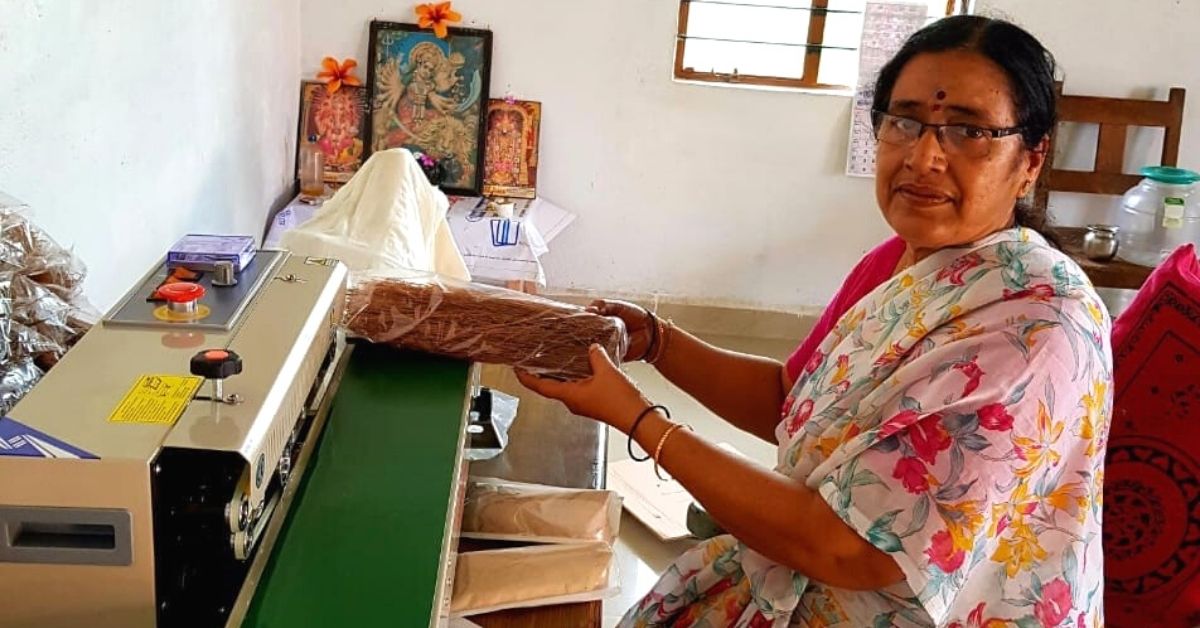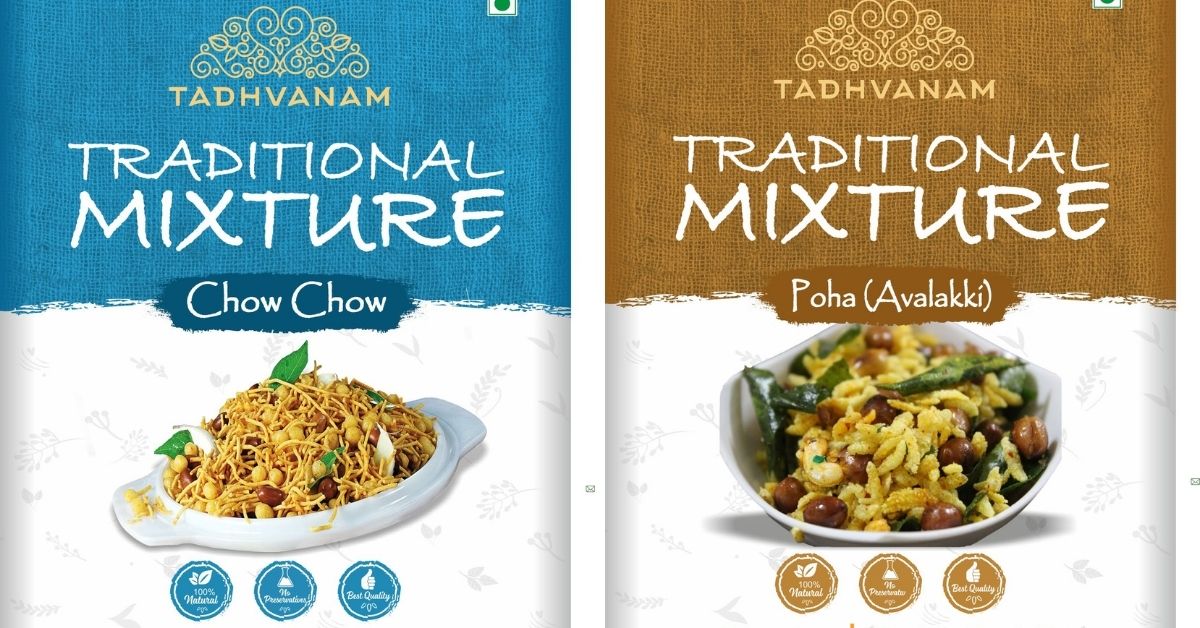In the recent annual budget, the Indian government emphasised the use of chemical-free, natural farming methods for farmers and committed policies towards it. But Saroja Patil from Nitturu village of Harihar taluk in Karnataka has been practising the same for over two decades.
She is the first woman entrepreneur of her village to become a pioneer in organic products. Moreover, the 63-year-old helped empower hundreds of women across Karnataka.
A native of Arablache in Bhadravati taluk, she says. “I am the second born among three daughters and I never studied beyond Class 10.”
She moved to Nittur village after marrying Nagendrappa in 1979. Her husband’s family owned 25 acres of farmland, but eventually, the family separated, and her husband became an owner of a smaller distributed piece of land.
To earn an additional income to make ends meet, Nagendrappa joined a coir factory in the village.

“The factory made mattresses, ropes and other products by converting coconut waste into coir. So, I decided to set up a small unit at home and start a business,” she says.
Taking some money on loan from family and using her savings, Saroja set up the unit to make coir mats, brushes and other items. Some months later, she also procured cows to set up a small dairy farm.
“The products had a great demand in the market, and the business started well. But poor infrastructure and erratic power supply did not help me earn expected profits. Eventually, the operations had to be shut down as the business started running into losses,” Saroja says.
It was then that Saroja thought of switching over to selling organic food and products. “I was always interested in cooking using millets and other traditional food grains. My husband grew organic vegetables and foodgrains like jowar, ragi, paddy and millets. So, I decided to sell the [harmful] chemical-free produce and traditional recipes using our farm fresh harvest,” she says.
Saroja started the business informally. But it was only after her products were appreciated and received a better value in the market that many farmers approached her. “I started teaching women and men alike to effectively use available farm resources for organic pest management, increasing soil quality and yield,” she adds.
Her work was recognised by the agriculture department officials who approached her to promote organic farming. She then joined the officials travelling around 20 villages near Harihar and other parts of the state, guiding farmers. “I became a better teacher, but also learned new techniques to grow crops from other farmers,” she says, adding, “The learning and earnings from agriculture helped me improve my family’s financial condition.”
Saroja then felt the need to scale up and promote the goodness of organic food to a larger audience.
Starting Tadhvanam
In 2014, she registered her business under the brand Tadhvanam, offering a range of products such as her famous banana flour, papad made from ragi, rice, jowar and pearl millets. Other unique products included vermicelli made from rice-wheat, ragi and other items.

She also offers a Rava idli mix, Navane Bisi bele bath mix, Ragi maldi — a mixture of ragi powder with spices, jaggery and native herbs. She also sells a wide range of chutneys.
Saroja says that one Eshwar Theerta, an organic food grower, taught her how to package and market the products. Eshwar adds, “Saroja has progressed far beyond where I taught her and feel proud of her achievements.”
The gritty entrepreneur has promoted her organic products at various exhibitions across cities, like Mumbai, Ahmedabad, New Delhi, Chennai and Karnataka. “I earned more confidence in my products when on one occasion, ISKCON approached me to place an order for rice papad as per their requirements. I felt proud about delivering and customising products according to customers,” she says.
Her banana flour, too, became an instant hit. “The product is made by drying bananas and making a powder through processing. It is a healthy replacement for maida or other types of flour. The daily use product was unique during those days and received a significant demand. I also shared 15 healthy recipes, including cake and spicy items like thakali (tomato rice), which customers liked,” she adds.
Promoting a Healthy Lifestyle
Eventually, Saroja started forming women self-help groups and taking them on her exhibition tours. So far, she has trained over 500 women across Nittur, Hospet, Chitradurga, Harihur, Bellary, Gadag, Dharwad and Hubli, helping them establish a business.
Many started their product manufacturing or entered organic farming, which helped them become financially independent.
Mamatha, a farmer from neighbouring Harihar village, says she became acquainted with Saroja about four years ago. She says, “I learned organic farming techniques from Saroja to grow paddy and seasonal vegetables on my farm. My husband passed away due to an illness. But organic farming has helped me sustain and become financially independent.”
While empowering women, Saroja helped them overcome and avoid hardships she faced as an entrepreneur. “I faced many challenges in convincing customers and farmers to opt for organic farming. To encourage buyers, I gave away samples in small mud pots. I requested them to try consuming [harmful] chemical-free food. They loved it and returned for more. Even today, the majority of my customers repeat,” she adds.

She says arranging finances also made her entrepreneurial journey difficult. “Unlike urban entrepreneurs, the government and private banks do not offer loans to rural women fearing losses and lack of confidence. I had to make arrangements with my family. Moreover, I did not know effective marketing techniques and social media did not exist during my early years. I had to build trust by interacting personally with customers,” Saroja shares.
The entrepreneur adds, “Today, I help women procure finances through reliable entities and share experiences in marketing and promoting their products.”
However, Saroja says the villagers welcomed her decision of becoming an entrepreneur, which helped her gain confidence and establish her business.
Today, Saroja earns a monthly business of Rs 50,000 and is content with her achievements. “I have employed 20 women working part-time as per their convenience. I aim to promote organic food. Many products available in the market are adulterated and I want to encourage people to choose healthier food,” she says.
She adds, “I want the concept of organic farming to reach every corner of the globe. City dwellers should practise organic farming and grow their vegetables to avoid consuming chemical-laden food. Every human should eat and live healthily.”
Edited by Yoshita Rao
No comments:
Post a Comment